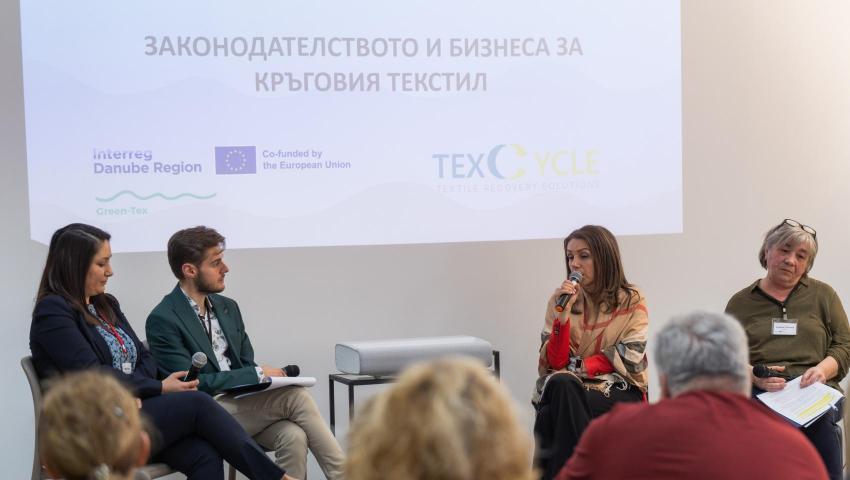Financial instability threatens voluntary textile collection systems

Separate textile collection systems are at a critical juncture due to financial instability and a lack of clear and timely regulatory measures. This was one of the main topics of the discussion held on April 8 in Varna, organized by the company TexCycle. The event was part of the international Green-Tex project, which includes partners from nine European countries and promotes the sustainable management of textile resources and the implementation of innovations in the sector. In the context of the mandatory introduction of separate textile collection in the European Union from January 1, 2025, the participants in the event shared their concerns that Bulgarian legislation has not yet adapted the requirements of the European directive and that the existing voluntary textile collection systems do not have the necessary financial mechanism to allow them to function effectively.
Against this backdrop, participants expressed the importance of a clear and timely regulatory process to ensure the sustainable functioning of these systems and to prevent the transfer of responsibility and costs to municipalities. Despite some differences of opinion, representatives of business, traders, manufacturers, industry organizations, municipalities and the non-governmental sector expressed their readiness to work together and seek solutions for the sustainable management of textile waste. Participants emphasized that there is capacity and expertise to solve these problems, and joint efforts can lead to the creation of clear mechanisms for financing and coordination between all stakeholders.
They united around the idea that separate textile collection systems can function effectively if there is good organization, appropriate infrastructure, a clear legislative framework and public engagement. Examples from some Bulgarian municipalities show that this model is working, with active interest from citizens and municipalities. At the same time, however, if concrete steps are not taken to preserve and develop the systems, there is a risk that these efforts will not be sustainable in the long term.
During the discussion, Sirma Jeleva, Sustainable Development Manager at TexCycle and Executive Director of the Bulgarian Association for Circular Textiles (BACT), pointed out that despite the growing interest from municipalities and citizens, business cannot bear the costs alone, especially in the conditions of a lack of predictability and stability in the regulatory environment.
Rositsa Koprivchina, Director of the Directorate of Public Transport, Cleanliness, Ecology and Greening in the Municipality of Stara Zagora, shared the good experience of the municipality, which is the first in Bulgaria to introduce a system for separate collection of textile waste. She emphasized that citizens show high interest in the system and emphasized the importance of joint work and coordination between different stakeholders for the successful expansion of the scope of the system and increasing its efficiency.
Iliyana Pavlova, Director of the Clean Industry Center at the Bulgarian Industrial Chamber (BIA), highlighted the importance of implementing the principles of the circular economy as a sustainable model that not only reduces waste but also increases resource efficiency. She emphasized that BIA actively supports businesses in the transition to the circular economy, which offers an alternative to the traditional linear model of production and consumption.
Representatives of the Ministry of Environment and Water (MEW), who were invited to the event, did not attend, although they were expected to provide specific answers regarding the regulatory framework and the introduced Extended Producer Responsibility (EPR). Participants in the discussion emphasized the need for better coordination with institutions and a clearer position on issues related to textile waste regulations. They expressed the opinion that the rapid adoption of the EPR should be achieved without compromising the effectiveness of the system, while at the same time declaring their readiness to cooperate with all stakeholders – institutions, producers, traders and municipalities, for the successful implementation of the system. This lays the foundation for future active interaction and is an opportunity to establish working groups to focus on solving key issues, such as the financial stability of the systems and the clarity of the legislation. When these issues are addressed, this will lead to the successful implementation of sustainable practices for textile waste management in Bulgaria as well.
During the event, the participants had the opportunity not only to join the discussion, but also to learn about the principles and best practices of the circular economy applied in sustainable textile waste management. They visited the TexCycle sorting and recycling center, where they observed the sorting processes on site, recycling and preparation of textile materials for reuse, demonstrating how these practices can be effectively implemented in a real environment.
You can learn more about the Green-Tex project at https://interreg-danube.eu/projects/green-tex/
